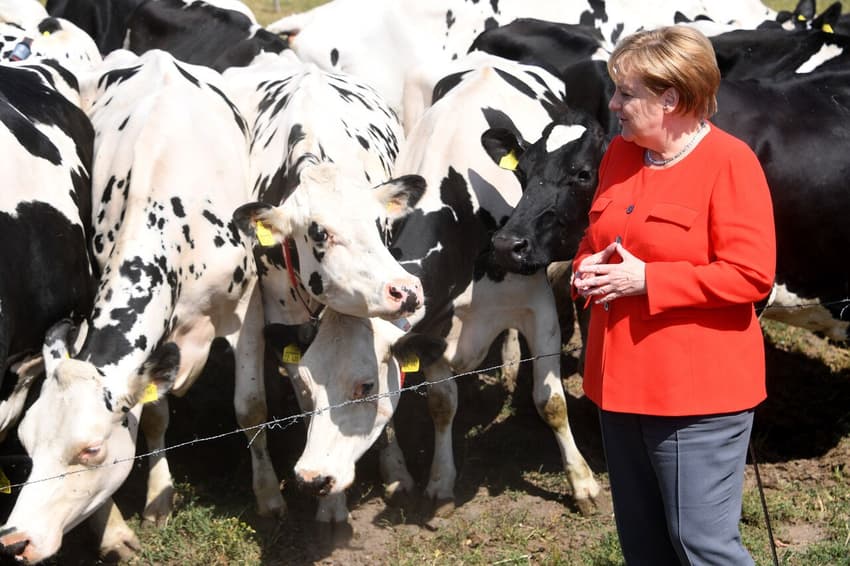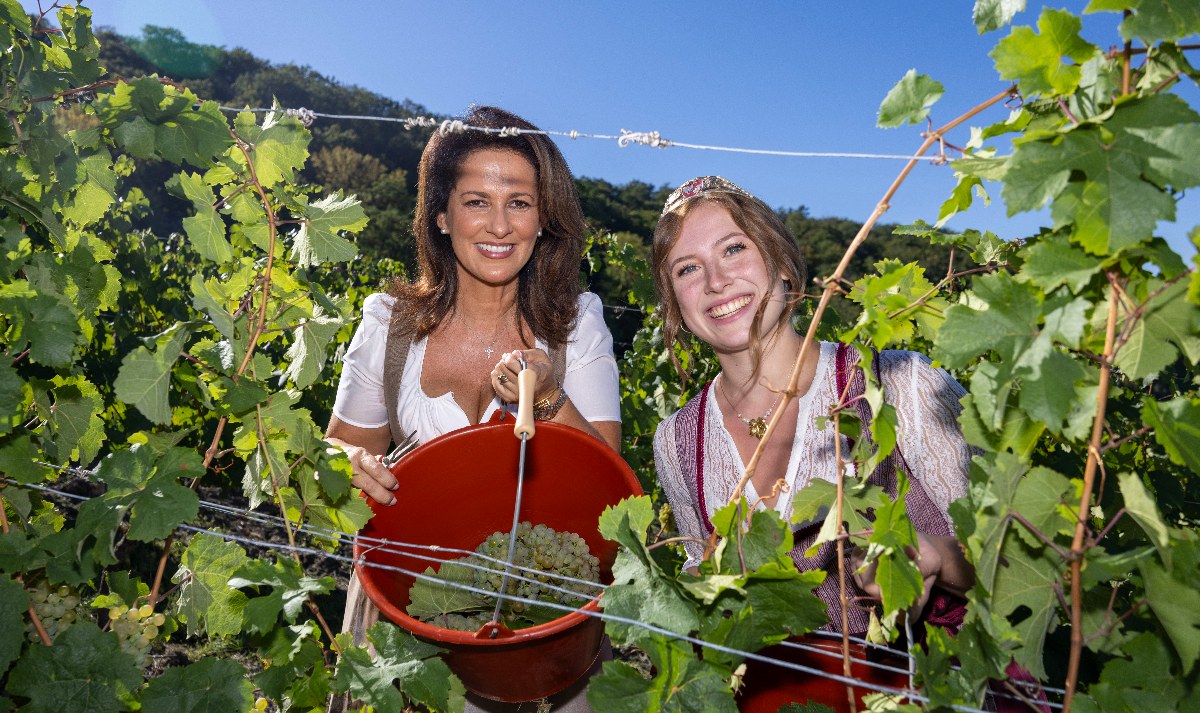Living in Germany: Wine princesses, Holstein cows and will we really see less bureaucracy?

In this week's roundup, we talk about plans to modernise Germany, German signage, wine princesses and world-famous Holstein cows.
Living in Germany is our weekly look at some of the news and talking points in Germany that you might not have heard about. Members can receive it directly to their inbox on Saturday.
Chancellor vows to speed up digitalisation and modernise Germany. Will it really happen?
It’s long been one of the more annoying parts of living in Germany. Whether it’s registering or getting a driver’s licence, many services seemingly cannot be done online. However, this week Chancellor Olaf Scholz said that Germany would take the digital route seriously. As part of a new drive, dubbed the ‘Deutschland-Pakt’, the government wants to modernise the country. As we reported, Scholz vowed that public authorities and offices would further digitalise their systems. By the end of 2024, he said services like applications for a new driving licence or identity card, or for parental allowance (Elterngeld) and unemployment benefits (Bürgergeld), would be possible either partially or fully online, according to the new plan.
Another part of the ‘modernise Germany plan’ involves attracting foreign talent from abroad. Scholz said that 13 million workers would retire by the middle of the next decade, leaving a gaping hole in the workforce unless more people are sought. He appealed for the Skilled Workers Immigration Act - set to go into effect in stages from November this year, but with the bulk of it from March 2024 - to be implemented right away. Scholz said the shortage of employees was a major source of worry for companies in Germany. The Chancellor, who was sporting an eye patch during his Bundestag speech due to a jogging accident, said that he wants to make the country more attractive to people from abroad by speeding up immigration procedures and minimising bureaucracy. Less bureaucracy in Germany? We’ll believe it when we see it (but, man, we do really want to see it!)
Tweet of the week
Apparently these excessive ‘mind the step’ notices are an art project. But to be honest, we’d rather have this than the lack of signage you often find in Germany.
Germany going full German: pic.twitter.com/fmUwfLtvWl
— Jonny Whitlam Berlin Guide (@WhitlamsBerlin) September 4, 2023
Where is this?

Photo: picture alliance/dpa | Heiko Becker
We have talked about Germany’s love of dubbing women ‘queens’ depending on the season. There’s the Spargelkönigin or asparagus queen and the Erdbeerkönigin, the strawberry queen. Now meet the Weinprinzessinnen! The wine princess pictured here on the left is Anna from Rödelsee in Bavaria. She’s cutting the first grapes from a vine in the area with Agriculture Minister Michaela Kaniber of the CSU, the Bavarian sister party of the Christian Democrats.
Did you know?
Many people are not so familiar with the northern German state of Schleswig-Holstein. But it’s well worth visiting, as Sarah Magill writes. One thing you might not know is that this state has its own cow named after it. Yes, those cows with the white fur and black patches are the Holstein-breed - named after Schleswig-Holstein. The breed originated in the Netherlands, specifically in the province of Friesland and the region of North Holland. The breed was then named after the province of Holstein in Germany, where some early Dutch Holsteins were imported.
Adding to their charm is that the Holstein cows are renowned for their exceptional milk-producing capabilities: a single Holstein cow can produce thousands of gallons of milk in a year, making them a popular choice for dairy farming.
Comments
See Also
Living in Germany is our weekly look at some of the news and talking points in Germany that you might not have heard about. Members can receive it directly to their inbox on Saturday.
Chancellor vows to speed up digitalisation and modernise Germany. Will it really happen?
It’s long been one of the more annoying parts of living in Germany. Whether it’s registering or getting a driver’s licence, many services seemingly cannot be done online. However, this week Chancellor Olaf Scholz said that Germany would take the digital route seriously. As part of a new drive, dubbed the ‘Deutschland-Pakt’, the government wants to modernise the country. As we reported, Scholz vowed that public authorities and offices would further digitalise their systems. By the end of 2024, he said services like applications for a new driving licence or identity card, or for parental allowance (Elterngeld) and unemployment benefits (Bürgergeld), would be possible either partially or fully online, according to the new plan.
Another part of the ‘modernise Germany plan’ involves attracting foreign talent from abroad. Scholz said that 13 million workers would retire by the middle of the next decade, leaving a gaping hole in the workforce unless more people are sought. He appealed for the Skilled Workers Immigration Act - set to go into effect in stages from November this year, but with the bulk of it from March 2024 - to be implemented right away. Scholz said the shortage of employees was a major source of worry for companies in Germany. The Chancellor, who was sporting an eye patch during his Bundestag speech due to a jogging accident, said that he wants to make the country more attractive to people from abroad by speeding up immigration procedures and minimising bureaucracy. Less bureaucracy in Germany? We’ll believe it when we see it (but, man, we do really want to see it!)
Tweet of the week
Apparently these excessive ‘mind the step’ notices are an art project. But to be honest, we’d rather have this than the lack of signage you often find in Germany.
Germany going full German: pic.twitter.com/fmUwfLtvWl
— Jonny Whitlam Berlin Guide (@WhitlamsBerlin) September 4, 2023
Where is this?

We have talked about Germany’s love of dubbing women ‘queens’ depending on the season. There’s the Spargelkönigin or asparagus queen and the Erdbeerkönigin, the strawberry queen. Now meet the Weinprinzessinnen! The wine princess pictured here on the left is Anna from Rödelsee in Bavaria. She’s cutting the first grapes from a vine in the area with Agriculture Minister Michaela Kaniber of the CSU, the Bavarian sister party of the Christian Democrats.
Did you know?
Many people are not so familiar with the northern German state of Schleswig-Holstein. But it’s well worth visiting, as Sarah Magill writes. One thing you might not know is that this state has its own cow named after it. Yes, those cows with the white fur and black patches are the Holstein-breed - named after Schleswig-Holstein. The breed originated in the Netherlands, specifically in the province of Friesland and the region of North Holland. The breed was then named after the province of Holstein in Germany, where some early Dutch Holsteins were imported.
Adding to their charm is that the Holstein cows are renowned for their exceptional milk-producing capabilities: a single Holstein cow can produce thousands of gallons of milk in a year, making them a popular choice for dairy farming.
Join the conversation in our comments section below. Share your own views and experience and if you have a question or suggestion for our journalists then email us at [email protected].
Please keep comments civil, constructive and on topic – and make sure to read our terms of use before getting involved.
Please log in here to leave a comment.